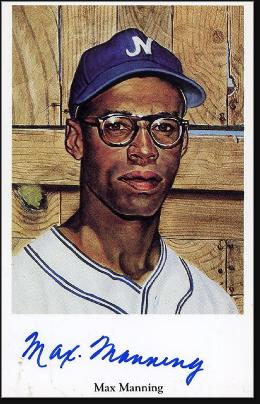
Sport: Baseball
Born: November 18, 1918
Died: June 23, 2003
Town: Pleasantville, New Jersey
Maxwell Cornelius Manning was born November 18, 1918 in Rome, Georgia and moved to Philadelphia and then Pleasantville, NJ as a boy. There Max learned the fine art of throwing a baseball, first in sandlot games in and around neighboring Atlantic City and later as a member of the Pleasantville High School Greyhounds. Tall, lanky and dreadfully nearsighted, Max also took the mound for the Johnson Stars, a team sponsored by Atlantic City political boss Nucky Johnson, and managed by Negro League legend Pop Lloyd. Everything Max threw was hard, heavy and down around the knees. His name appeared regularly in the local papers. Max also pitched a few games for the Camden Giants.
In 1937, a scout for the Detroit Tigers wired Max that the team was interested in signing him. The offer was sight-unseen, which was problematic because Detroit assumed he was white. Max happened to be the lone black player on his high-school team. The offer was rescinded when his race was revealed.
Instead, Max enrolled at Lincoln University in Oxford, PA, where he played basketball and baseball, and struck up a friendship with Monte Irvin. Both players signed with the Newark Eagles in 1938. In his first game as an Eagle, in 1939, Max fanned the first five batters he faced—all members of the 1937 champion Homestead Grays. In 1940, teammates began calling him “Dr. Cyclops” because of the thick glasses he wore—a film of the same name was a big hit that spring.
Max had distinguished himself as one of the better pitchers in black baseball when his career was interrupted by World War II. He served in the Quartermasters Corps in Europe from 1942 to 1945, driving supply trucks for Patton’s Third Army and the 101st Airborne. He did not pitch in any official games but did coach a military basketball team.
Back in a baseball uniform in 1946, Max—now 27—went 11–1 and teamed with fellow strikeout artist Leon Day to lead Newark to the Negro League championship over the Kansas City Monarchs. The Eagles played a mix of league games and exhibitions and, during one stretch, Max won 15 straight. After the series, he joined Satchel Paige’s barnstorming group, which traveled with the Bob Feller All-Stars. In one game, Max fanned 14 big leaguers.
After adding a changeup to his fastball and curve, Max was among the most complete pitchers in all of baseball, white or black. This caught the attention of the New York Giants, who expressed an interest in signing him. Negro League teams were not part of organized baseball, which meant the Eagles did not have to be compensated when their players were signed away. Max insisted that the Giants make a deal with the Eagles, and the Giants lost interest.
Sometime during the 1948 season (a season when he was arguably the best pitcher in black baseball) Max developed his shoulder, robbing him of his fastball. It was probably a rotator cuff tear, and he actually underwent surgery to attempt to fix it—an unusual decision at that time. Although Max pitched well in the years that followed, his 90-plus mph fastball never returned. Without a spot in the majors, and with the Negro Leagues disintegrating, Max pitched in Venezuela and Mexico for a time, wrapping up his career in the early 1950s in Canada. Throughout the 1940s, he played winter ball in Cuba.
During his career, Max answered to two nicknames in addition to Dr. Cyclops: “Milio” and “Professor”—which turned out to be prophetic. After baseball, Max set his sights on a teaching career and attended Glassboro State on the GI Bill. He pitched for the baseball team while earning his degree, and taught elementary school in Pleasantiville until his retirement in the early 1980s. In 1986, Max was inducted into the Glassboro State (now Rowan University) Hall of Fame. He passed away at the age of 84. A park in his hometown was named in his honor.
In 2020, when statistics from Negro League seasons were officially recognized by MLB, it was possible to put numbers to Max’s mound success. He pitched in 114 league games between 1939 and 1948, with a 54–28 record and 3.21 ERA. In 1947 and 1948—when he was named an All-Star—he led the Negro National League with a total of 31 starts and 25 complete games, and his 12 victories in ’47 led the NNL.